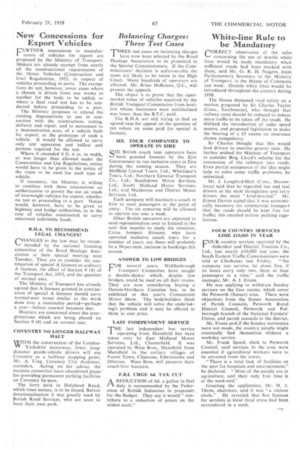White-line Rule to . be Mandatory
Page 35

If you've noticed an error in this article please click here to report it so we can fix it.
rORRECT observance of the rules
concerning the use of double white lines would be made mandatory when sufficient roads had been marked with them, said Mr. G. R. H. Nugent, Joint Parliamentary Secretary to the Ministry of Transport, in the House of Commons last week. Double white lines would be introduced throughout the country during 1958.
The House discussed road safety on a motion proposed by Sir Charles Taylor (Cons., Eastbourne), who thought that railway rates should be reduced to induce more traffic to be taken off the roads. He disliked the introduction of radar speed meters, and proposed legislation to make the bearing of a £5 excess on insurance claims compulsory.
Sir Charles thought that this would lead drivers to exercise greater care. He further wished the Minister of Transport to consider Brig. Lloyd's scheme for the conversion of the railways into roads. Even partial acceptance of the idea might help to solve some traffic problems, he submitted.
Mr. J. Langford-Holt (Cons., Shrewsbury) said that he regarded bus and taxi drivers as the most thoughtless and lorry drivers the most "kind-hearted." Mr. Ernest Davies stated that it was economically necessary, for commercial transport that the roads should be kept free for traffic; this entailed stricter parking regulations.
FOUR' COUNTRY SERVICES LOSE £10,000 IN YEAR
COUR country services operated by the Aldershot and District Traction Co., Ltd., lost nearly £10,000 last year, the South Eastern Traffic Commissioners were
told at Chichester last Friday. " No company can survive, let alone live, if its buses carry only two, three or four passengers at a time," said the traffic manager, Mr. A. I. Evans.
He was applying to withdraw Sunday services on the four routes, which cover the Petworth (Sussex) area. There were objections from the • Sussex Association of Parish Councils, Petworth Rural District Council, Petworth and Pulborough branch of the National Farmers' Union, and parish councils in the district.
Mr. Evans said if the Sunday economies were not made, the country people might eventually find themselves without a weekday service.
Mr. Frank Speed, clerk to Petworth Council, said services in the area were essential if agricultural workers were to be attracted from the towns.
"There is a total lack of facilities on the spot for hospitals and entertainment," he declared. " Most of the people are in agriculture, and their only free time is at the week-end."
Granting the application, Mr. H. J. Thom, chairman, said it was "a vicious circle." He revealed that five licences for services in local rural areas had been surrendered in a week.












































































































